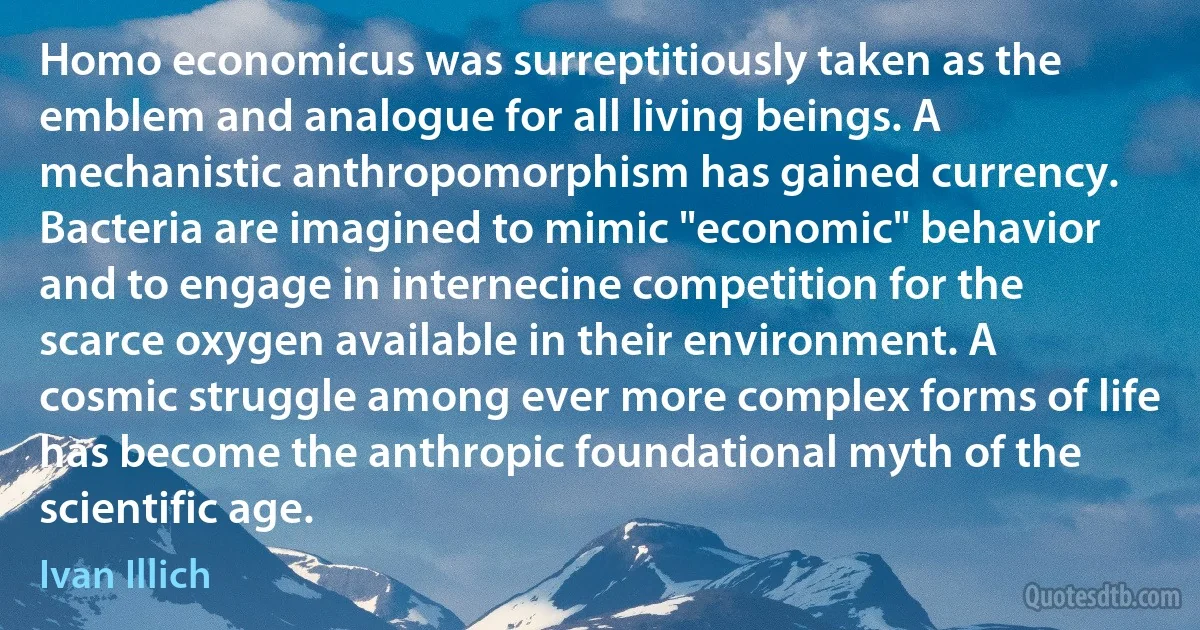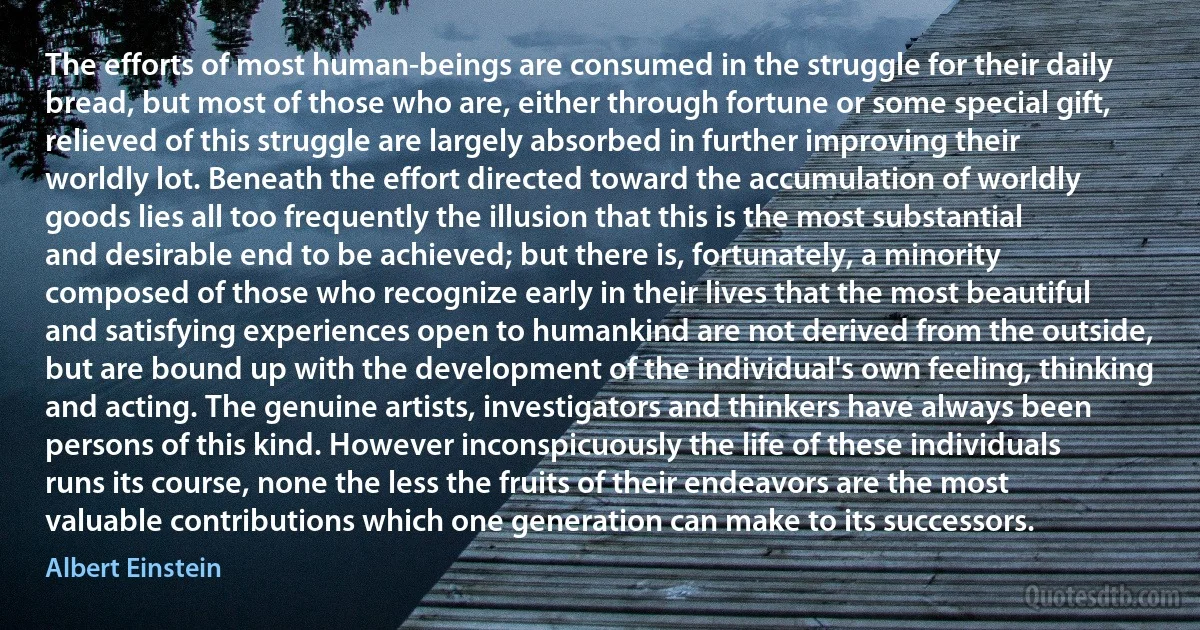Struggle Quotes - page 96
Covid-19 has revealed glaring failures and monstrous brutalities in the current capitalist system. It represents both a crisis and an opportunity. Contests for controlling the narratives around the meaning of this pandemic will be the terrain of struggle for either a new, more humane common sense and society or a return to the status quo ante. The outcome of those contests is uncertain; everything depends on the actions that people take into their hands.

Noam Chomsky
It is not a dream, it is a simple feat of scientific electrical engineering, only expensive - blind, faint-hearted, doubting world! . . . Humanity is not yet sufficiently advanced to be willingly led by the discover's keen searching sense. But who knows? Perhaps it is better in this present world of ours that a revolutionary idea or invention instead of being helped and patted, be hampered and ill-treated in its adolescence - by want of means, by selfish interest, pedantry, stupidity and ignorance; that it be attacked and stifled; that it pass through bitter trials and tribulations, through the heartless strife of commercial existence. So do we get our light. So all that was great in the past was ridiculed, condemned, combated, suppressed - only to emerge all the more powerfully, all the more triumphantly from the struggle.

Nikola Tesla
I'm amused that Darwin, at whom I've been taking another look, should say that he also applies the ‘Malthusian' theory to plants and animals, as though in Mr Malthus's case the whole thing didn't lie in its not being applied to plants and animals, but only - with its geometric progression - to humans as against plants and animals. It is remarkable how Darwin rediscovers, among the beasts and plants, the society of England with its division of labour, competition, opening up of new markets, ‘inventions' and Malthusian ‘struggle for existence'. It is Hobbes' bellum omnium contra omnes and is reminiscent of Hegel's Phenomenology, in which civil society figures as an ‘intellectual animal kingdom', whereas, in Darwin, the animal kingdom figures as civil society.

Karl Marx
The new year of 1854 found slavery excluded from more than half the States by State constitutions, and from most of the national territory by congressional prohibition. Four days later commenced the struggle which ended in repealing that congressional prohibition. This opened all the national territory to slavery, and was the first point gained. But, so far, Congress only had acted; and an indorsement by the people, real or apparent, was indispensable to save the point already gained and give chance for more. This necessity had not been overlooked; but had been provided for, as well as might be, in the notable argument of "squatter sovereignty," otherwise called "sacred right of self government," which latter phrase, though expressive of the only rightful basis of any government, was so perverted in this attempted use of it as to amount to just this: That if any one man, choose to enslave another, no third man shall be allowed to object.

Abraham Lincoln
The proposition that there is a struggle between the white man and the negro contains a falsehood. There is no struggle. If there was, I should be for the white man. If two men are adrift at sea on a plank which will bear up but one, the law justifies either in pushing the other off. I never had to struggle to keep a negro from enslaving me, nor did a negro ever have to fight to keep me from enslaving him. They say, between the crocodile and the negro they go for the negro. The logical proportion is therefore; as a white man is to a negro, so is a negro to a crocodile; or, as the negro may treat the crocodile, so the white man may treat the negro. The 'don't care' policy leads just as surely to nationalizing slavery as Jeff Davis himself, but the doctrine is more dangerous because more insidious.

Abraham Lincoln
After Bruno's death, during the first half of the seventeenth century, Descartes seemed about to take the leadership of human thought... in promoting an evolution doctrine as regards the mechanical formation of the solar system... but his constant dread of persecution, both from Catholics and Protestants, led him steadily to veil his thoughts and even to suppress them. The execution of Bruno had occurred in his childhood, and in the midst of his career he had watched the Galileo struggle in all its stages. He had seen his own works condemned by university after university under the direction of theologians and placed upon the Roman Index. ...Since Roger Bacon, perhaps, no great thinker had been so completely abased and thwarted by theological oppression.

René Descartes
I was barked at by numerous dogs who are earning their food guarding ignorance and superstition for the benefit of those who profit from it. Then there are the fanatical atheists whose intolerance is of the same kind as the intolerance of the religious fanatics and comes from the same source. They are like slaves who are still feeling the weight of their chains which they have thrown off after hard struggle. They are creatures who-in their grudge against the traditional "opium for the people"-cannot bear the music of the spheres. The Wonder of nature does not become smaller because one cannot measure it by the standards of human moral and human aims.

Albert Einstein
And so the story's told of a hearty group of men. It's a tale of their triumphs and their woes. Be it raids and melees ancient or the modern worker's struggle that inspires men to stand up for their rights. And should we fall down by the wayside in this ever-changing world, we can look back to these heroes of our past with their staunch determination and ferocious iron will, no tyranny would quell them in their task.

Dropkick Murphys
The denial about [the] global peak in the United States is already fierce, as investments in car-dependent, oil-addicted infrastructure are greater here than in any other nation and Americans consider their way of life a[n]... entitlement. [...] The economic... [struggle] among... all nations, [...] will be considerable and is certain to lead to increasingly desperate competition for diminishing supplies of oil [and every other resource].

James Howard Kunstler
So, guided by the great ideals of this country, willing to work and dare to fulfill your dreams, there is really no limit to the expectations of your tomorrow. If you wish a sheltered and uneventful life, then you are living in the wrong generation. No one can promise you calm, or ease, or undisturbed comfort. But we can promise you this. We can promise enormous challenge and arduous struggle, hard labor and great danger. And with them we can promise you, finally, triumph--triumph over all the enemies of mankind.

Lyndon B. Johnson
From Stettin on the Baltic to Varna on the Black Sea, the regimes planted by totalitarianism have had more than thirty years to establish their legitimacy. But none - not one regime - has yet been able to risk free elections. Regimes planted by bayonets do not take root....If history teaches anything, it teaches self-delusion in the face of unpleasant facts is folly....Our military strength is a prerequisite to peace, but let it be clear we maintain this strength in the hope it will never be used, for the ultimate determinant in the struggle that's now going on in the world will not be bombs and rockets but a test of wills and ideas, a trial of spiritual resolve, the values we hold, the beliefs we cherish, the ideals to which we are dedicated.

Ronald Reagan
Fascism lasted twelve years in Germany. Stalinism lasted twice as long in the Soviet Union. There are many common features but also certain differences. Stalinism exhibited a much more subtle kind of hypocrisy and demagogy, with reliance not on an openly cannibalistic program like Hitler's but on a progressive, scientific, and popular socialist ideology.
This served as a convenient screen for deceiving the working class, for weakening the vigilance of the intellectuals and other rivals in the struggle for power, with the treacherous and sudden use of the machinery of torture, execution, and informants, intimidating and making fools of millions of people, the majority of whom were neither cowards nor fools. As a consequence of this "specific feature" of Stalinism, it was the Soviet people, its most active, talented, and honest representatives, who suffered the most terrible blow.

Andrei Sakharov
The author is quite aware of the monstrous relations in human and international affairs brought forth by the egotistical principle of capital when it is not under pressure from socialist and progressive forces. He also thinks, however, that progressives in the West understand this better than he does and are waging a struggle against these manifestations. The author is concentrating his attention on what is before his eyes and on what is obstructing, from his point of view, a worldwide overcoming of estrangement, obstructing the struggle for democracy, social progress, and intellectual freedom.
Our country has started on the path of cleansing away the foulness of Stalinism. "We are squeezing the slave out of ourselves drop by drop" (an expression of Anton Chekhov). We are learning to express our opinions, without taking the lead from the bosses and without fearing for our lives.

Andrei Sakharov


